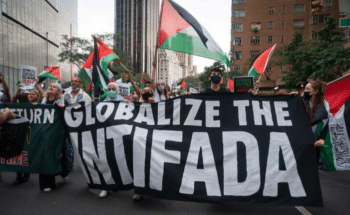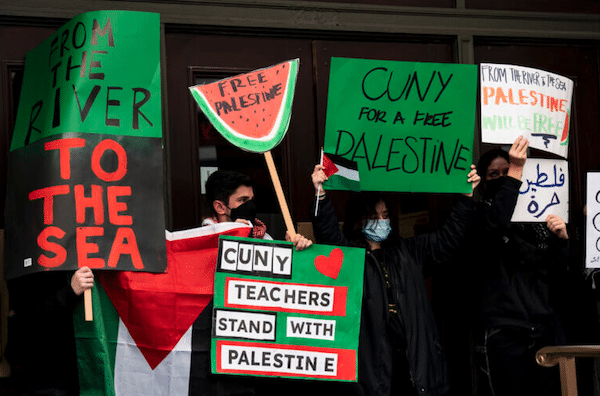Several months ago, the Writing Across the Curriculum (WAC) program at Lehman College1 (a campus of the City University of New York) invited us to design a panel on ‘activism and pedagogy’ for their upcoming conference on ‘Engagement, Equity and Antiracism.’ Given the obscene brutality of Israel’s U.S.-backed genocide in Gaza- which has murdered over 30,000 people in four months, one-third of them children and more than 4,800 of them students, while depriving almost the entire Palestinian population in Gaza of food, water, medical care, and shelter, trapped within closed borders—we knew that we needed to speak about Palestine.
To do so also felt important to us as CUNY students, faculty, and alumni in light of both the institution’s ongoing repression of speech on Palestine (in line with escalating repression on university campuses across the U.S.), and CUNY’s longstanding anticolonial legacies. Our original idea for the panel, which we titled ‘Globalize the Intifada! Mapping struggles for Palestine from the streets to our classrooms,’ was to map the necessary relationship between antiracist teaching practices in the classroom (a key focus of the conference) and collective movements for justice at the institutional level, while reimagining what a community supportive of justice for all (including Palestinians) at Lehman and across New York City might look like.
We also aimed to explore the meaning of the Arabic word intifada—translated as “shaking off” or “resistance”—a translingual term which refers to the act of rising up against oppressors, in relationship with key terms of the conference such as abolition and collective liberation. While ‘intifada’ is often associated with the forms of nonviolent civil resistance practiced during the First Intifada (1987-93) such as the boycotting and burning of Israeli products, the organization of local, alternative forms of government, the staging of mass sit-ins and protests, and the refusal to pay taxes, it also extends to the right to armed resistance against Israel as an occupying force—a right protected under international law.2 Palestinian-led New York community organization Within Our Lifetime (WOL) explains that to Globalize the Intifada necessitates that, “We build upon the revolutionary spirit and inspiration of Palestinian resistance, in the understanding that our own liberation is either collective or nonexistent, and that it must reflect the interconnectedness of our struggles in our neighborhoods and homelands.” To Globalize the Intifada at Lehman College means to work in solidarity with colonized people from Lenapehoking to Gaza, resisting colonialism, racism, and imperialism from wherever we are. The call has become highly charged on U.S. college campuses precisely because it has the courage to publicly reject the Israeli settler colonial project.

(PHOTO: WITHIN OUR LIFETIME)
What came next is a now-predictable series of events. After someone contacted the WAC program to protest the use of the term ‘intifada’ (saying it made them feel unsafe), the program coordinators scrambled to appease them, immediately apologizing and changing the title of the panel. We were not notified of this change until after our panel title had been publicly altered. By this time, a screenshot of the original panel title with four of our names had been published online, and the cogs of the outrage machine were beginning to turn. On February 5, we read in right-wing news media that the head of the Lehman WAC program, Jane Higgins, had released a public statement canceling our panel. In the statement, Higgins wrote that the WAC program at Lehman, which specializes in antiracism and abolitionist pedagogy, was ‘dedicated to bringing love to the classroom’ and that the goal of the conference was ‘to bring people together, not to cause harm or make students feel unsafe.’ She explained that the panel had been canceled after speaking with us because we did not ‘share the same goal.’3
As students and workers organizing for Palestine within the CUNY system, we are no strangers to being thrown under the bus by our own administration. We are also familiar with the doxxing cycle of zionist news media, which frequently smears and incites violence against CUNY students and workers, most notably in the cases of organizers Nerdeen Kiswani, Fatima Mohammed, and Shellyne Rodriguez. However, what we find particularly affronting and are driven to address here is the insidious way in which WAC coordinators weaponized the language of love, antiracism, and care to silence support for Palestinian liberation. This hypocrisy is part of a broader trend in left academia and is thus important to address.
In a meeting following the public cancellation of the panel, conference organizers repeated the messaging that concern for students—the desire to ‘make sure everyone is safe’—had motivated their decision. But whose safety do the organizers really care about? The truth is, their perceived job security was the primary form of safety at stake. The decision of the organizers to cancel the panel and distance themselves from us panelists in the face of zionist vitriol shows a blatant disregard for other forms of safety. Despite delivering instructions on how to manage the media response in the interests of both the conference and the university, organizers failed to enquire once as to the wellbeing of any of us, or to offer support or guidance in navigating the online hate that arose in response to the panel (note that one among our panelists is an undergraduate Muslim woman student whose name was published across multiple news outlets).
More significantly, in a climate of rising violence against Palestinians around the world, including within the U.S., the program’s concession to zionist narratives that demonize Palestinian resistance contributes to the unsafety of Palestinians, Arabs, and Muslims everywhere, including the Palestinian, Arab, and Muslim student body at Lehman. The conference organizers argued that our panel needed to be canceled in order for other important work on antiracism to be able to continue as planned. We wholeheartedly refuse the logic of this approach. In doing so, we take up a long legacy of loving coalitional solidarity at CUNY by scholar-teacher-activists such as June Jordan, who in her 1982 poem ‘Moving Towards Home’ wrote the famous lines: ‘I was born a Black woman / and now / I am become a Palestinian / against the relentless laughter of evil / there is less and less living room / and where are my loved ones?’ Antiracism that is complicit in the institutional silencing of support for Palestine is not antiracism, but rather an institutional discourse utilized to preserve the professional positions of those it serves.
Regarding the organizers’ initial claims that they had renamed the panel to avoid triggering possible feelings of ‘unsafety,’ we reject the assumption that as instructors we should prioritize feelings of unsafety over teaching our students about forms of real unsafety in the world. While as educators we will always do our best to create environments in which all of our students can feel safe, we cannot and will not prioritize that over a commitment to critical thinking and to the rigorous analysis of structural injustice. Toni Cade Bambara, another great CUNY educator-activist, teaches us that coming to see the violent reality of structures of injustice we may have been taught to take for granted can result in feelings of unsafety, and that transformative learning may thus require that students negotiate feelings (feelings, not realities) of unsafety in the classroom.4 As teachers, our job is to support and encourage our students through whatever feelings come up as they learn to challenge preconceived ideas and engage critically with the world around them.
During an active genocide, ‘love’ does NOT mean staying silent in order to avoid professional repercussions. James Baldwin once wrote, ‘I use the word “love”… not in the infantile American sense of being made happy but in the tough and universal sense of quest and daring and growth.’5 If the Lehman WAC program is really ‘dedicated to bringing love to the classroom‘ then it must embody this daring and growth by reinstating the panel and refusing to contribute to discourses that serve genocide.
As the organizers and speakers on this panel, we stand by our original title and pledge to do what we can to contribute to globalizing the intifada and upholding the cause of Palestinian resistance in all of the spaces we work in and move through. We will hold this panel at a larger venue soon to share these perspectives in a refusal of the silencing of academic solidarity with Palestine. We have also urged the other WAC conference presenters to highlight Palestine and academic freedom in their own remarks. We are inspired by the strength, ingenuity, persistence, and bravery of those fighting for liberation within Palestine, and we will not be silenced while they continue their just struggle.
Long live the intifada!
Britt Munro is a WAC fellow at Lehman College, and a PhD student in English at CUNY Graduate Center. She organizes with CUNY For Palestine.
Conor Tomás Reed is the author of New York Liberation School: Study and Movement for the People’s University, and the Program Director of the Shape of Cities to Come Institute.
Lucien Baskin is a PhD student in Urban Education at the CUNY Graduate Center and co-chair of the American Studies Association Critical Prison Studies Caucus. They organize with Cops Off Campus and CUNY for Palestine and are a rank-and-file member of PSC-CUNY.
Notes:
- ↩ Writing Across the Curriculum is an interdisciplinary and social justice-focused approach to teaching writing and composition. The WAC program at CUNY is being closed in 2025 due to budget cuts and the ongoing assault on the humanities, an assault directly connected to the attacks on speech in solidarity with Palestine on campus.
- ↩ The right of people to resist oppression and occupation, as Birzeit University points out, is not, however, dependent on its endorsement within international law: ‘Our ability to narrate was never out of our hands, and resistance in all of its manifestations and forms does not need the pre-approval of static international law codes.’
- ↩ In an Orwellian twist, our panel slot was replaced with a session entitled “Reading Lab: Practices of Freedom in the Classroom.”
- ↩ Toni Cade Bambara, “Report on the Summer Seminar, Pre-Baccalaureate Program, City College,” Adrienne Rich Papers, series 4, folder 385, Schlesinger Library, Radcliffe.
- ↩ James Baldwin, The Fire Next Time (New York: Vintage Books, 1993), 94.

